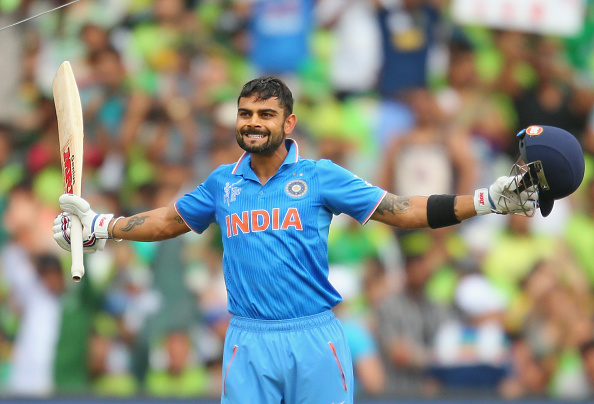Is GenY blurring hierarchy lines an ailment to the sport or a road to the future?
After Sunil Gavaskar castigated the Indian cricket team for their rejection of a hard taskmaster like Anil Kumble, it is now former South African opener Herschelle Gibbs warning the Proteas to refrain from the “buddy-buddy” attitude in the dressing room. Is this attitude hurting the national teams?

One of the burning questions in modern cricket, which has been asked time and again over the last few years, is what exactly should be the role of a head coach in a team. Unlike most other sports, where coaches and managers play a quintessential part, cricket hasn’t found them very significant with its evolution. While various suggestions to the conundrum have been mooted, it had largely been kept undecided until the Anil Kumble-Virat Kohli feud sparked the debate all over again.
The same drill followed as it drew large criticism from the masses, some very interesting ones. And one such example saw Indian cricketing legend, Sunil Gavaskar, lash out at the team's treatment of another legend, Anil Kumble. When the public was informed that it was the players' unhappiness with Kumble’s stern coaching approach which led to his removal, the 68-year-old decided to give them a piece of mind.
Taking a dig at the players’ attitude, Gavaskar said, “So you want softies. You want somebody to just tell you, 'ok boys, don't practice today because you guys are not feeling well, or take a holiday, go shopping'… If any of the players are complaining, I feel those players are the ones who should be left out of the team."
Gavaskar is difficult to blame for taking the leg-spinner’s side given the astounding figures Kumble has posted during his stint as India’s coach in the past one year. The Men in Blue were on a dazzling run under his guidance with series wins at Australia, England, New Zealand and Bangladesh before the run came to an end at the ICC Champions Trophy final against Pakistan.
But, just how much had his contribution actually been relevant to the side’s success is questionable. India has toured without a coach previously in 2007 with team manager turned supervisor Dr MV Sridhar in England and Ireland, as well as their last tour in West Indies with Chandu Borde playing the same role. And both the times, the results weren’t disappointing. Going by that, skipper Virat Kohli could take the credit for last year’s results as well and that’s what happened. And given that he is a man of the moment, the CAC decided to back him rather than the spin legend.
Gavaskar’s words were taken as a senior’s advice and all and sundry turned a deaf ear. However, one month and two days later, Herschelle Gibbs’ cautionary message to his country’s cricket administration, who are running out of time in appointing Russell Domingo’s successor, carries a familiar undertone.
Praising Australia’s more hands-on approach at the administrative level, which has been effective and fresh to the sport, the former SA opener said, “The coach needs to be in control and for that reason, I believe an Australia coach – who won’t tolerate this ‘buddy-buddy’ attitude’ – could work.”
The Proteas are currently going through a rough patch. Following their back to back defeats against Pakistan and India in the Champions Trophy, which saw them flounder at the group stage itself, they have continued their erratic form in England. After losing the T20I series 2-1 to the Poms, South Africa are now level on 1-1 in the four-match Test series.
The once devastating South African opener was evidently unhappy with the team’s recent displays and criticised the players for their complacent attitude and lack of commitment. Former cricketers have often found it difficult to bridge the gap between themselves and the current generation, and both Gibbs and Gavaskar did put an emphasis on it in their respective comments.
Cricket as a game has evolved drastically over the years, and although the players’ passion concerning it is still unwavering, their attitude towards it has definitely changed. International players like Virat Kohli, Rohit Sharma, MS Dhoni or Ravichandran Ashwin play an average of 40-50 matches a year excluding IPL. No more are they allowed to take their own sweet time to understand the pitch and get into the groove, and the immense number of games they play in succession makes sure one doesn’t need such time to adjust.
The T20 culture, which was thrown into prominence by the introduction of Indian Premier League back in 2011, has not only made the sport more entertaining to watch but also more difficult to deal with. The strenuous amount of focus players need to have in order to perform at such a high level doesn’t allow any complacency whatsoever. The amount of time they spend playing the game requires modern training regimes, which keep them uber-fit throughout the year.
Hence, physical and mental shortcomings, which was one of Gibbs’ primary concerns, are clearly out of the equation. Which leaves us with the same question again; what kind of head coach does a team

The stakes in it are way bigger now, which has also led to better rewards. The blistering sixes, adrenaline rush and heart thumping finishes make cricketers overnight stars with Twitter feeds and Facebook posts brimming with applause. The heroes of the day get to bask in the accolades for weeks, and a consistent performer like Virat Kohli consequently has earned legendary status in no time.
The bright limelight is bound to influence their psychology and will undoubtedly affect their humility. Hence, that a difference as small as the clashing playing styles of Kohli and Kumble could make their relationship ‘untenable’ is quite a possibility today. After all, it is the captain who is in the middle of the action leading the side, changing plans if things go south, and in some cases selecting the team too. So, Kohli’s reluctance to take orders from Kumble, who in all probability was forcing them on him, is quite understandable.
Cricket as a game has been made too obvious now, with modern technology creeping into every playing aspect. The detailed analytics, constant monitoring, big data and now
There’s hardly any guidance one could offer in terms of strategy. On the other hand, what the sport essentially demands now is a proper team manager, and that is a role that technology as yet cannot fill. It is the players’ temperaments that need to be sharpened every day, and I think it was Farokh Engineer who has read the situation better.
Speaking to the media, the former aggressive Indian batsman, said, “It is sad to see Kumble go but this definition of head coach must be changed. It should be called a cricket manager, a person who will be like a father figure.”
While South Africa’s predicaments differ to those of India, the solution remains more or less the same. And one of the members of the five-man panel that Cricket South Africa has appointed to choose their next coach is someone who has been intricately linked with both the sides before, Gary Kirsten.
The 49-year-old, while at India’s helm, presided over team Blue's excellent overseas performances and a World Cup winning run in 2011 before stepping down. Taking control of the Proteas next, he took them to number one in World Test rankings before giving over the reins to Domingo Russell prior to the 2013 Champions trophy tournament. And as far as a hard task master is concerned, the introverted but successful coach has been far from it. His strength lay more
In my opinion, the cordial, amicable relationship between the coach and the players is exactly what modern cricket needs right now. And BCCI’s appointment of Ravi Shastri, who has seen some success as India's manager previously from 2014-16, could turn out to be rather a good one.

Comments
Sign up or log in to your account to leave comments and reactions
0 Comments